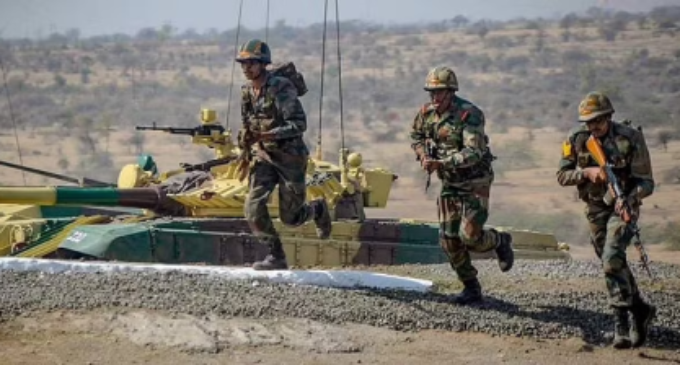Amid Taiwan crisis, annual joint exercise of special forces of India, US begins near China border

NEW DELHI,AUG 8: The annual joint exercise between the special forces of India and the United States commenced in Bakloh, Himachal Pradesh on Monday, the defence ministry said.
This is the 13th edition of the exercise — “Ex Vajra Prahar 2022” — according to a statement issued by the ministry.
The joint exercise, which will go on for 21 days, aims to share best practices and experiences in areas such as “joint mission planning and operational tactics” to improve the interoperability between the special forces of the two countries, the statement said.
Both the teams would jointly train, plan and execute a series of special operations, counter-terrorist operations and airborne operations in simulated scenarios on mountainous terrain, it added.
Meanwhile, China on Monday continued its unprecedented military drills around Taiwan, extending the schedule of war games launched in retaliation to the visit by US House Speaker Nancy Pelosi to the breakaway island which Beijing claims is part of its territory.
The People’s Liberation Army (PLA) Eastern Theatre Command, which oversees Taiwan, said on Monday it would continue drills in waters near Taiwan island, focusing on anti-submarine and air-to-ship strikes, state-run Global Times reported.
The PLA conducted joint drills involving all wings of its armed forces in six areas around the island from August 4 to 7.
The PLA’s latest announcement notice did not specify the location of the exercises nor did it mention when they would end.
The PLA on Sunday proceeded with the plan and continued realistic combat-scenario joint exercises in the sea and air space around the island of Taiwan practicing island capturing drills and bomber deterrence flights in Taiwan Strait, a rehearsal for real operation, state-run Global Times reported on Sunday.
The PLA Command in a late last night press release said its forces continued its joint combat training exercises as scheduled on Sunday in the waters and airspace around the Taiwan island.
The focus on Sunday was set on testing the capabilities of using joint fires to strike land targets and striking long-range air targets, an early Monday state-run Xinhua news agency report said.
The air force under the theatre command deployed multiple types of warplanes, including early warning aircraft, bombers, jamming aircraft, fighter-bombers and fighter jets, to conduct drills on such combat missions as joint reconnaissance, airspace control operation, strikes on ground targets, and air support and cover.
Supported by naval and air combat systems, the air strike forces, together with long-range multiple launch rocket systems and conventional missile troops, conducted drills of joint precision strikes on targets.
Multiple bomber formations flew across the Taiwan Strait from north to south and from south to north, while several fighter jets conducted joint drills with destroyers and frigates.
The operation has tested the tactics of systems warfare under information-based conditions, and honed and improved the capabilities to destroy crucial island targets with precision strikes, Zhang Zhi, an air force officer of the PLA Eastern Theatre Command, said according to the report.
During the four-day exercises, several batches of multiple types of warplanes attached to the PLA Eastern Theatre Command conducted systematic island attack drills, with the focus being honing the joint land attack and long-range air strike capabilities, the PLA Eastern Theatre Command said.
While there is no official announcement here on ending the drills, reports said the PLA is reviewing the impact of the unprecedented war games involving all wings of its military as questions remained about its next move, heightening Beijing’s dilemma over the future course of action.
In the last four days, the Chinese military flew hundreds of planes, drones and fired missiles with different ranges which Taiwan termed as simulated attacks and appealed for international help.
China also suspended a range of defence and military exchanges with the US besides imposing sanctions on Pelosi as part of a slew of countermeasures to protest against her trip to Taipei on Tuesday and Wednesday that infuriated Beijing, which saw it as a violation of the one-China policy.
China claims Taiwan as part of its territory and has threatened to annex it by force if necessary.
The two sides split in 1949 after a civil war, but Beijing considers visits to Taiwan by foreign officials as recognising its sovereignty.
Taiwan’s Ministry of National Defence emphasised that its military was keeping a watch on the situation and dispatched aircraft and ships to respond accordingly.
Facing rare public criticism at home for not being able to stop the visit despite high voltage rhetoric, China carried out the heaviest mobilisation of its naval, air force and missile forces to carry out targeted bombardment in the busy Taiwan Strait, a lifeline of transportation of vital cargo shipments, since Thursday, the day after Pelosi left Taiwan.
The visit of Pelosi, the top US leader in 25 years to visit Taiwan, came at a politically sensitive time as President Xi Jinping who is set to complete his second five-year term this year and is widely expected to continue in power, unlike his predecessors who retired after a 10-year tenure.
The third term for Xi, 68, is widely expected to be endorsed by the once-in-a-five-year Congress of the ruling Communist Party of China (CPC), which is expected to be held in the next few months.
China apprehends that Pelosi’s visit will open floodgates for similar visits by world leaders, especially from Japan and the European Union (EU), undermining the credibility of its claims over the island whose majority population preferred to remain independent.
Chinese experts said tensions triggered by Pelosi’s Taiwan visit will continue to mount, but military conflict over the issue is unlikely.
Shi Yinhong, international relations professor at the Renmin University of China, said strain in international relations is a natural result of strategic interactions but the US and China are not close to engaging in combat.
“Confrontation will (escalate) but a conflict is still unlikely, even as the suspension of military communication has surely made prevention of incidental clashes more difficult, ” Shi told the Hong Kong-based South China Morning Post on Sunday.
After the Chinese military began four days of intensive live-fire drills around Taiwan, the Pentagon said its Japan-based aircraft carrier USS Ronald Reagan would be extending its scheduled deployment in the Western Pacific.
“We will conduct standard air and maritime transits through the Taiwan Strait in the next few weeks, consistent, again, with our long-standing approach to defending the freedom of the seas and international law,” national security spokesman John Kirby said.
And, we will take further steps to demonstrate our commitment to the security of our allies in the region, Kirby said.
Chinese Foreign Minister Wang Yi warned Washington on Saturday not to stir up a bigger crisis after the US announced it would take further steps by sending aircraft and warships to the waters near Taiwan in the coming weeks.
The PLA has also announced month-long drills in the Yellow Sea facing South Korea, where the US troops are stationed.
-PTI






